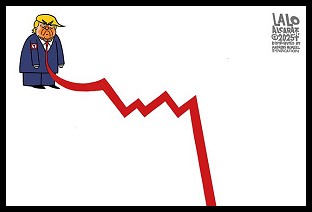[This article now cross-published by The Progressive...]
 We've discussed, many times over the years, the madness of Internet Voting schemes. Today we've got yet another piece of disturbing evidence that underscores why such a scheme for American democracy would be nothing short of insane.
We've discussed, many times over the years, the madness of Internet Voting schemes. Today we've got yet another piece of disturbing evidence that underscores why such a scheme for American democracy would be nothing short of insane.
The BRAD BLOG has highlighted how easily Internet elections can be hacked by all sorts of nefarious folks (perhaps most disturbingly, without the knowledge of election officials); how various experiments in Internet Voting have proved disastrous (Hello, Canada! Hello, Honolulu! Hello, Oscars!); and how it is simply impossible to do a true pilot test of any such Internet Voting schemes in advance, since the most dangerous tactics that bad guys might throw at an Internet-based election in order to game it are actually illegal. Because of that, good guy "white hat hackers" wouldn't be able to use those same techniques to test the security of any Internet Voting scheme before it was actually put into use in a live election.
Moreover --- and perhaps the deal-breaker when it comes to the viability of Internet Voting ever being workable in public elections --- even if the Internet Voting scheme remains secure, there is no way that the citizenry can know that was the case. Any such scheme would require faith and trust in others, which is decidedly not what our system of oversight and checks and balances in public elections is supposed to be built on. Thus, even a secured Internet Voting scheme would seriously undermine the basic tenets of, and overall confidence in, American democracy.
Now, Kim Zetter at Wired's "Threat Level" blog offers yet another reason why the Internet, as it currently exists, is simply unfit to serve as a means for secure online voting. Her recently published article, which doesn't focus on voting, is alarmingly headlined "Someone's Been Siphoning Data Through a Huge Security Hole in the Internet".
And no, in this case, it's not the NSA. At least as far as we know.
Zetter details a "huge security hole" indeed, one which, as she documents, was found to have been used earlier this year to re-route "vast amounts" of U.S. Internet data all the way out to Belarus and Iceland, where it was intercepted in a classic "man-in-the-middle" fashion, before being sent on to its intended receiver. During the hijack attack, the senders and receivers of the Internet data were none the wiser, just as would likely be the case if the same gaping security hole in the Internet's existing architecture was used to hijack votes cast over the Internet, change them, and then send them on to the server of the intended election official recipient...


 Sunday 'Zero Day' Toons
Sunday 'Zero Day' Toons Soc. Sec. Expert Warns DOGE Hastening Collapse, Privati-zation: 'BradCast' 4/10/2025
Soc. Sec. Expert Warns DOGE Hastening Collapse, Privati-zation: 'BradCast' 4/10/2025 'Green News Report' 4/10/25
'Green News Report' 4/10/25
 Trump Blinks, Chaos Reigns, Markets Spike as Many Tariffs Remain Despite 90-Day 'Pause': 'BradCast' 4/9/25
Trump Blinks, Chaos Reigns, Markets Spike as Many Tariffs Remain Despite 90-Day 'Pause': 'BradCast' 4/9/25 SCOTUS Deportation Ruling Grimmer Than First Appears: 'BradCast' 4/8/25
SCOTUS Deportation Ruling Grimmer Than First Appears: 'BradCast' 4/8/25 'Green News Report' 4/8/25
'Green News Report' 4/8/25 Cliff Diving with Donald: 'BradCast' 4/7/25
Cliff Diving with Donald: 'BradCast' 4/7/25 Sunday 'Don't Look Down' Toons
Sunday 'Don't Look Down' Toons 'Green News Report' 4/3/25
'Green News Report' 4/3/25 'Mob Boss' Trump's Trade Sanctions Tank U.S., World Markets: 'BradCast' 4/3/25
'Mob Boss' Trump's Trade Sanctions Tank U.S., World Markets: 'BradCast' 4/3/25 Crawford Landslide in WI; Booker Makes History in U.S. Senate: 'BradCast' 4/2/25
Crawford Landslide in WI; Booker Makes History in U.S. Senate: 'BradCast' 4/2/25 Judge Ends Challenge to GA's Unverifiable, Insecure Vote System: 'BradCast' 4/1/25
Judge Ends Challenge to GA's Unverifiable, Insecure Vote System: 'BradCast' 4/1/25 Bad Court, Election News for Trump is Good News for U.S.: 'BradCast' 3/31
Bad Court, Election News for Trump is Good News for U.S.: 'BradCast' 3/31 Vets Push Back at Plan to Slash Health Care, 80K V.A. Jobs: 'BradCast' 3/27/25
Vets Push Back at Plan to Slash Health Care, 80K V.A. Jobs: 'BradCast' 3/27/25 Signal Scandal Worsens for Trump, GOP; Big Dem Election Wins in PA: 'BradCast' 3/26
Signal Scandal Worsens for Trump, GOP; Big Dem Election Wins in PA: 'BradCast' 3/26 'Emptywheel': Trump NatSec Team Should 'Resign in Disgrace': 'BradCast' 3/25/25
'Emptywheel': Trump NatSec Team Should 'Resign in Disgrace': 'BradCast' 3/25/25 USPS 'Belongs to the People, Not the Billionaires': 'BradCast' 3/24/25
USPS 'Belongs to the People, Not the Billionaires': 'BradCast' 3/24/25
 VA GOP VOTER REG FRAUDSTER OFF HOOK
VA GOP VOTER REG FRAUDSTER OFF HOOK Criminal GOP Voter Registration Fraud Probe Expanding in VA
Criminal GOP Voter Registration Fraud Probe Expanding in VA DOJ PROBE SOUGHT AFTER VA ARREST
DOJ PROBE SOUGHT AFTER VA ARREST Arrest in VA: GOP Voter Reg Scandal Widens
Arrest in VA: GOP Voter Reg Scandal Widens ALL TOGETHER: ROVE, SPROUL, KOCHS, RNC
ALL TOGETHER: ROVE, SPROUL, KOCHS, RNC LATimes: RNC's 'Fired' Sproul Working for Repubs in 'as Many as 30 States'
LATimes: RNC's 'Fired' Sproul Working for Repubs in 'as Many as 30 States' 'Fired' Sproul Group 'Cloned', Still Working for Republicans in At Least 10 States
'Fired' Sproul Group 'Cloned', Still Working for Republicans in At Least 10 States FINALLY: FOX ON GOP REG FRAUD SCANDAL
FINALLY: FOX ON GOP REG FRAUD SCANDAL COLORADO FOLLOWS FLORIDA WITH GOP CRIMINAL INVESTIGATION
COLORADO FOLLOWS FLORIDA WITH GOP CRIMINAL INVESTIGATION CRIMINAL PROBE LAUNCHED INTO GOP VOTER REGISTRATION FRAUD SCANDAL IN FL
CRIMINAL PROBE LAUNCHED INTO GOP VOTER REGISTRATION FRAUD SCANDAL IN FL Brad Breaks PA Photo ID & GOP Registration Fraud Scandal News on Hartmann TV
Brad Breaks PA Photo ID & GOP Registration Fraud Scandal News on Hartmann TV  CAUGHT ON TAPE: COORDINATED NATIONWIDE GOP VOTER REG SCAM
CAUGHT ON TAPE: COORDINATED NATIONWIDE GOP VOTER REG SCAM CRIMINAL ELECTION FRAUD COMPLAINT FILED AGAINST GOP 'FRAUD' FIRM
CRIMINAL ELECTION FRAUD COMPLAINT FILED AGAINST GOP 'FRAUD' FIRM RICK SCOTT GETS ROLLED IN GOP REGISTRATION FRAUD SCANDAL
RICK SCOTT GETS ROLLED IN GOP REGISTRATION FRAUD SCANDAL VIDEO: Brad Breaks GOP Reg Fraud Scandal on Hartmann TV
VIDEO: Brad Breaks GOP Reg Fraud Scandal on Hartmann TV RNC FIRES NATIONAL VOTER REGISTRATION FIRM FOR FRAUD
RNC FIRES NATIONAL VOTER REGISTRATION FIRM FOR FRAUD EXCLUSIVE: Intvw w/ FL Official Who First Discovered GOP Reg Fraud
EXCLUSIVE: Intvw w/ FL Official Who First Discovered GOP Reg Fraud GOP REGISTRATION FRAUD FOUND IN FL
GOP REGISTRATION FRAUD FOUND IN FL



















 I'm in the middle of a number of other things, but I wanted to just offer a quick --- and very belated --- note of congrats to longtime citizen Election Integrity advocate Tom Courbat of Riverside County, CA. (Decidedly not to be confused with Pennsylvania's
I'm in the middle of a number of other things, but I wanted to just offer a quick --- and very belated --- note of congrats to longtime citizen Election Integrity advocate Tom Courbat of Riverside County, CA. (Decidedly not to be confused with Pennsylvania's  After many months of chatting back and forth via email, we were both finally able to work out our schedules so that I could talk with
After many months of chatting back and forth via email, we were both finally able to work out our schedules so that I could talk with  Election 2013 is but a memory --- good or bad --- for much of the nation. But, in Virginia, election officials, attorneys and partisans will still be busy as elves throughout much of the holiday season, and potentially even beyond, determining final results of the statewide November 5th Attorney General's election this year.
Election 2013 is but a memory --- good or bad --- for much of the nation. But, in Virginia, election officials, attorneys and partisans will still be busy as elves throughout much of the holiday season, and potentially even beyond, determining final results of the statewide November 5th Attorney General's election this year. Sometimes it's a good idea to get a full explanation before these things become fodder in a contentious partisan legal election contest. So that's what we've tried to do. Happily, the General Registrar of Bedford County, VA was more than willing to help.
Sometimes it's a good idea to get a full explanation before these things become fodder in a contentious partisan legal election contest. So that's what we've tried to do. Happily, the General Registrar of Bedford County, VA was more than willing to help. This story is horrific. It struck me even more so this morning, given that I had just been in contact with Virginia state Senator Creigh Deeds (D) last week on several occasions and had asked him to appear as my guest on the KPFK/Pacifica Radio BradCast.
This story is horrific. It struck me even more so this morning, given that I had just been in contact with Virginia state Senator Creigh Deeds (D) last week on several occasions and had asked him to appear as my guest on the KPFK/Pacifica Radio BradCast.
 The U.S. Department of Justice has filed a vigorous
The U.S. Department of Justice has filed a vigorous  On this week KPFK/Pacifica Radio BradCast I was joined by Heather Parton --- much better known as the great blogger
On this week KPFK/Pacifica Radio BradCast I was joined by Heather Parton --- much better known as the great blogger  The last of the votes to be tallied in Virginia, prior to the certification deadline at 11:59pm ET tonight is done. With the
The last of the votes to be tallied in Virginia, prior to the certification deadline at 11:59pm ET tonight is done. With the 
 For the first time since the bulk of votes were tallied in Virginia on Election Night last Tuesday, the Democratic candidate for Attorney General, state Sen. Mark Herring appears to now have taken the lead over Republican state Sen. Mark Obenshain in the razor-thin results of more than 2.2 million votes cast.
For the first time since the bulk of votes were tallied in Virginia on Election Night last Tuesday, the Democratic candidate for Attorney General, state Sen. Mark Herring appears to now have taken the lead over Republican state Sen. Mark Obenshain in the razor-thin results of more than 2.2 million votes cast. As of late Saturday, just 55 votes separated the Democratic candidate from the Republican in the Virginia Attorney General's race,
As of late Saturday, just 55 votes separated the Democratic candidate from the Republican in the Virginia Attorney General's race,  On Thursday night,
On Thursday night,  We
We 













